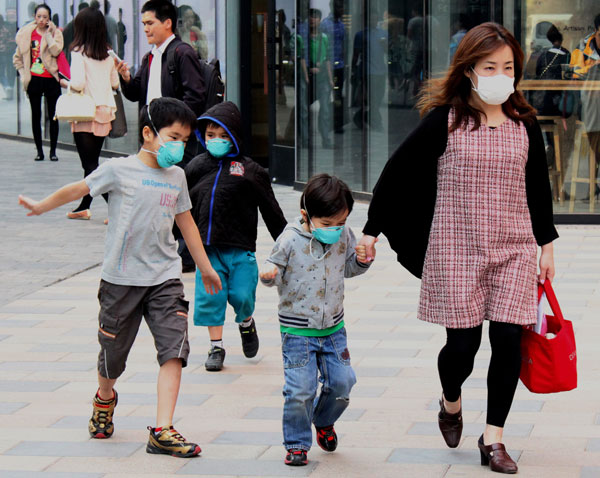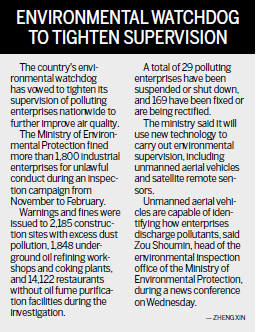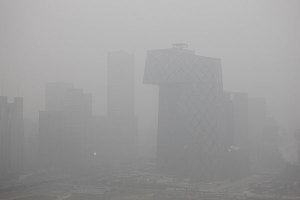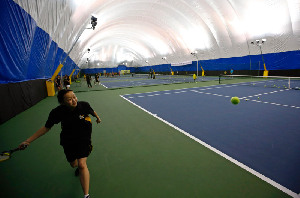 |
|
A mother with her three boys wearing respirators in Sanlitun village, Chao Yang district, Beijing, April 8. Photo provided for Chinadaily |
With Tianjin and Hebei, capital to reprise measures from 2008 Games
Beijing is considering stricter traffic controls and suspension of polluting enterprises during meetings at the Asia-Pacific Economic Cooperation that are scheduled to take place later this year in the city's Huairou district.
To prevent the smog from enshrouding the capital during the APEC event, the city vowed to reprise measures taken during the 2008 Beijing Olympics, including traffic control to cut emissions based on vehicles' license plate numbers, suspension of certain industrial operations around the city's suburbs and halting work at construction sites.
Zhuang Zhidong, deputy head of the Beijing Environmental Protection Bureau, said the capital will undertake the measures together with neighboring cities and provinces.

Officials in the Beijing-Tianjin-Hebei hub will jointly come up with an air quality warning platform to share information about pollutant intensity, Zhuang said, while carrying out regional inspections and supervision of polluting workshops, illegal outdoor barbecues and coal-fired boilers.
Zhuang also appealed to Beijing's neighboring provinces to adopt the latest standard for fuels - the National V standard - that calls for sulfur content of no more than 10 parts per million.
Beijing has adopted the National V standard for gasoline and diesel fuels, which is expected to be implemented nationwide by the end of 2017, according to the timetable for national fuel quality upgrades.
The poor fuel quality from neighboring provinces has also contributed to the capital's smoggy days, according to the bureau.
Yang Keng, a member of the National Committee of the Chinese People's Political Consultative Conference, suggested during the annual meeting of the top political advisory body last month that key regions should adopt the latest standard as soon as possible to reduce sulfur pollution.
Zhuang said cities in the Beijing-Tianjin-Hebei region have greater difficulty improving air quality than cities around the Yangtze River and Pearl River deltas. The region has serious imbalances in economic development, which makes it difficult to meet a consistent standard, Zhuang said.
Whether air quality during the APEC event will be as good as it was during the Olympics is uncertain, said Zou Shoumin, head of the environmental inspection office of the Ministry of Environmental Protection.
At a news briefing on Wednesday, Zou said he was not sure the quality could be matched, considering the different pollutants and diffusion conditions at play.
In addition, the drastic anti-smog measures, including odd-even license plate rules and industrial suspensions are unconventional and can only be applied during a special period, Zou said.
Peng Yingdeng, an expert in urban environment management from the ministry, said diffusion conditions play an important role in air quality.
The 2008 Olympics took place during the city's rainy season and coincided with ideal pollutant diffusion conditions, whereas the APEC event will be held in the fall, which typically sees more adverse conditions for dispersal, he said.
Measures such as those taken during the Olympics can only be employed at an unusually important moment because of their influence on the country's economic development and people's livelihood, he said.
zhengxin@chinadaily.com.cn
|
 |
 |
|
Students practice in dome inflated with purified air in Beijing |
